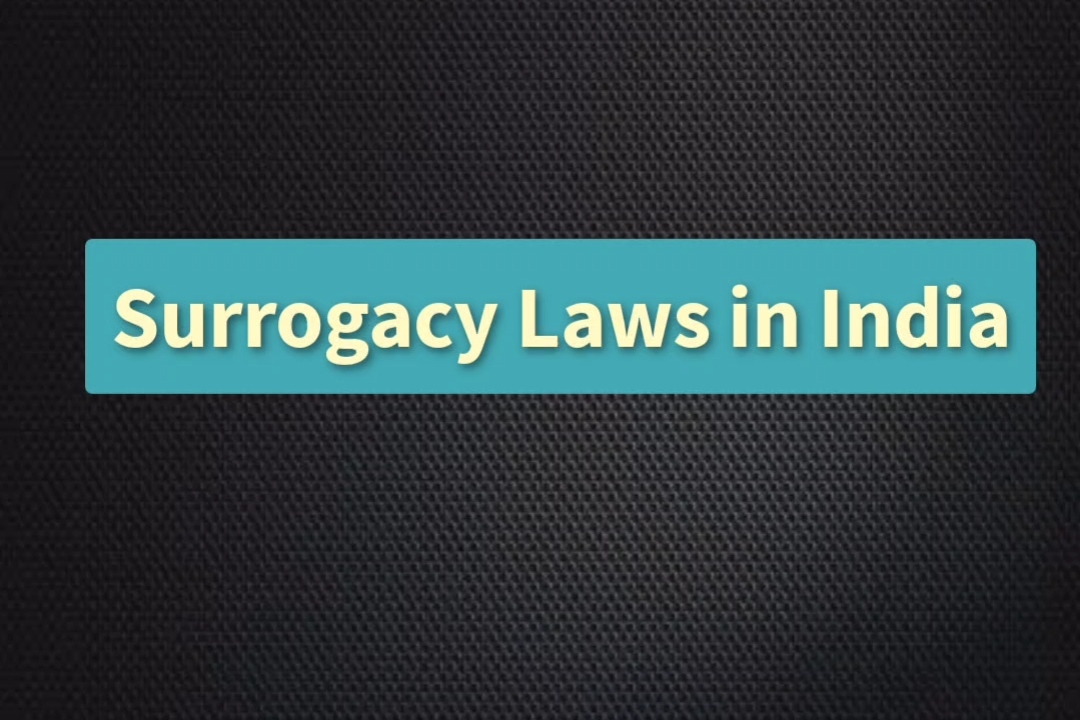
Introduction
According to the Indian National Guidelines for regulations of IVF clinic, Surrogacy means an arrangement in which a woman agrees to carry a pregnancy that is genetically unrelated to her and her husband, to carry it to term and hand over the child to the genetic parents for whom she is acting as a surrogate. People usually opt for surrogacy if pregnancy is either medically impossible or considered risky for the mother’s health. Apart from that, there are various reasons why couples opt for surrogacy, such as male fertility, a couple not being able to conceive traditionally, health issues affecting the uterus of the woman, etc. It is considered a very helpful option for single persons, same-sex couples, and couples who cannot conceive a baby naturally. It has made aspirations for parenthood come true for many people. Infertility is seen as a major problem as kinship and family ties are dependent on progeny therefore surrogacy acts as a blessing in their life.
Historical Background
In Black law’s dictionary, the word “surrogate” is derived from a Latin word, ‘surrogatus’, meaning a ‘substitution or replacement’ i.e., a person appointed in place of another. Surrogacy is an old concept, tracing back to Biblical times. During that time, surrogacy was conceived naturally and there is a mention of traditional surrogacy in Biblical times. The year of the landmark judgment that came in the case of Baby Manji Yamada vs Union of India, is considered a landmark year for surrogacy. This decision given by the Supreme Court legalized commercial surrogacy in India as there was no law prohibiting it. However, in 2013, commercial surrogacy was banned in India. India legalized surrogacy in 2002 and has emerged over the years. It was framed under the guidelines issued by the Indian Council of Medical Research.
Types of Surrogacy

Based on genetic relationships,
- Traditional Surrogacy
- Gestational Surrogacy
Traditional Surrogacy
In traditional surrogacy, the surrogate mother uses her eggs and is artificially inseminated either by the intending father or by a sperm donor. The surrogate mother is the biological mother of the child but she has to give up her parental rights on the child. The child will have genetic relation with the surrogate mother and thus it makes the process a little complicated emotionally and legally but is still considered a great option for the following people:
- Single men
- The intended mother who cannot produce healthy eggs
- Same-sex male couples
Gestational Surrogacy
In gestational surrogacy, an embryo from the eggs of the intending parents is formed in the test tube using Artificial Reproductive Techniques (ART) and transferred to the womb of the surrogate mother. The child is not biologically related to the surrogate mother in gestational surrogacy. Gestational surrogacy is considered less complicated than other forms of surrogacy and is considered a great option for the following people:
- Couples struggling with infertility
- People who don’t want a genetic link with the surrogate mother
- Who’s unable to carry a safe pregnancy
- Same-sex couples
- Single parent
Based on the payment made to the surrogate mother
- Commercial Surrogacy
- Altruistic Surrogacy
Commercial Surrogacy
In commercial surrogacy, the payment is made to the surrogate mother beyond the medical expenses. The payment is pre-determined between the surrogate mother and intending parents. Commercial Surrogacy is seen as using women’s wombs for-profit and therefore is criticized by many people.
Altruistic Surrogacy
In an altruistic surrogacy, the surrogate mother does not receive any monetary compensation except for medical expenses. Usually, the surrogate mother is a close friend or a family member of the intending parents. The pregnancy is carried out of the goodness of the heart and not for any profits.
Critical Analysis of The Surrogacy Regulation Bill, 2016
The 2016 Surrogacy Regulation Bill violates the fundamental rights given under the Constitution of India. There are various issues with the bill, it infringes the following articles:
- Article 14: According to the bill, the female should be married to be a surrogate mother. It infringes Article 14, Right to equality as unmarried female is not given the same rights of the married women.
- Article 19: According to the bill, commercial surrogacy is banned meaning surrogate mothers cannot perform surrogacy as a profession. It infringes Article 19 (1)(s), all citizens of India have the right to practice any profession or to carry on any occupation, trade, or business.
- Article 21: According to the bill, a certificate of infertility is an essential requirement under surrogacy. It infringes Article 21, Right to Privacy. It is yet not clear why the bill requires such private information is essential.
Critical Analysis of the Surrogacy (Regulation) Bill, 2019
The Surrogacy (Regulation) Bill, 2019 was introduced by Dr. Harsh Vardhan, Minister of Health and Family Welfare in Lok Sabha on July 15, 2019. A Select Committee, chaired by Shri Bhupender Yadav, was constituted at Rajya Sabha on November 21, 2019. On February 21, 2020, the report came. The Bill states the following things:
- Only Altruistic Surrogacy is allowed in India
- Surrogacy can only be practiced if only one or both the partners are proven infertile
- Infertility is defined as an inability to have a child after 5 years of unprotected sex.
Few important provisions of the Bill are as follows:
- Section 4 Clause(ii): The grounds for surrogacy is stated under Section 4 Clause(ii). The grounds are as follows:
- If one or both intending parents has proven infertile
- It should be only altruistic surrogacy
- Children produced should not be used for purpose of prostitution, sale, or any other abuse
- Section 4 Clause(iii): The following conditions must be fulfilled by the intending couple undergo surrogacy:
- Certificate of essentiality
- Certificate for surrogate murder
- Certificate for intending couples
Certificate of essentiality: the following should be proved under certificate of essentiality:
- Either one or both of the intending parents should prove their infertility
- It should be given by District Medical Board
Certificate for surrogate mother: On the following conditions, a surrogate mother can be eligible:
- She should be married
- She should be between the age of 25-35
- She should be a close relative of the intending family
- Only gestational surrogacy is allowed
- Should be the first time that she is a surrogate
- Possess a certificate that she is mentally and physically fir to undergo the surrogacy
Certificate for intending couple: on the following grounds, a couple can possess an intending certificate:
- The age of wife should be 23-50
- The age of the husband should be 26-55
- The couple should be citizens of India
- They should not have a surviving child of their own
- They should be married for at least five years or more
- Section 6: The followings things are mentioned under Section 6:
- The surrogate mother should be informed about the side effects
- She should give the consent in writing stating that she is aware of the side effects
- Any time before the embryo is implanted in her womb, the surrogate mother can rescind her consent.
- Section 7: Section 7 states that the intending parents cannot abandon their child because of any reason, including:
- Birth defect
- Genetic defect
- Sex of the child
- Medical conditions
- Conceiving more than one baby
The child will be given prerogatives of a natural child and will be considered a biological child of the intending parents.
- Section 10: Section 10 states that the following:
- The surrogacy clinic should be registered by the appropriate authority
- Surrogacy clinics should apply for registration within 60 days from the date of appointment
Changes Brought under the Surrogacy (Regulation) Bill, 2020
The following changes brought under the Surrogacy (Regulation) Bill, 2020 are as follows:
- The bill only allows altruistic surrogacy in India and completely bans commercial surrogacy. The surrogate mother will only receive medical expenses and insurance coverage under this bill.
- Under this bill, the word “infertility” is removed. The selected committee said that five years is too long a period to wait and is considered as unreasonable.
- Under this bill, Indian-origin married couples, as well as Indian single women (only widows and divorcees between the age of 35 and 45 years), are also allowed to apply for surrogacy.
- Under this bill, the insurance cover for surrogate mothers has been increased from 16 months to 36 months considering the complications faced by them even after pregnancy.
- Under the bill, if anyone practices commercial surrogacy, he/she will be punished with a fine of up to Rs.10 lakhs and imprisonment up to 10 years.
- Under this Bill, National Surrogacy Board, as well as State Surrogacy Board, will be established to advise and supervise government policy.
Comparative Analysis with other Nations
There are many countries where surrogacy is not considered legal like Germany, Italy, Spain, France, Portugal, and Bulgaria. All forms of surrogacy are prohibited in these countries. On the other hand, in countries like United Kingdom, South Africa, and Argentina, surrogacy is encouraged. Everything related to surrogacy is governed by laws. Bringing the child into countries where surrogacy is banned is difficult as there isn’t any international law on surrogacy. The child’s legal parentage is not recognized by any international convention. In most countries, commercial surrogacy is still banned as motherhood is considered an act by the goodness of the heart and not for any profits. Ethical and legal implications have been a deterrent for the acceptance of commercial surrogacy. Different countries have different laws governing surrogacy. In some countries, the DNA test with the child should match at least one intending parent, whereas, in other countries, even it is not a requirement. The rights of the surrogate mother and the child are protected in most countries.
Issues related to Surrogacy
Surrogacy is only allowed for those women who can’t carry a baby naturally. The birth certificate of the child is provided under the name of intending parents, any information regarding the surrogate mother is not mentioned anywhere. There aren’t any international agreements or jurisprudence dealing with the domain of surrogacy. Deciding the nationality of the child is another problem that is faced by many countries. Commercial surrogacy is still illegal in most countries as it places the reproductive capacity of the woman in the marketplace. In addition to legal issues, the domain of surrogacy has faced moral and ethical issues over the years. It always has been a controversial topic worldwide as the removal of the act of childbearing from the idea of motherhood is still considered morally wrong on various grounds.
Landmark Judgements
Baby Manji Yamada vs Union of India, 2009
In this case, the child was born to an Indian surrogate mother for a Japanese couple. The Japanese couple was separated before the few months of the child’s birth. The child’s future was in the dark as the intending parents were separated now. The indenting father decided to take custody of the child and wanted to take the child to Japan but the legal framework had no provision for such a case. In the end, the Supreme Court intervened and allow the child to leave India with his grandmother. This was the first case where it was held that surrogacy is permissible in India.
Jan Balaz vs Anand Municipality, 2009
In this case, the question of the nationality of the surrogate child was brought under. Germany refused to give the nationality to the surrogate child. Both the babies were given Indian nationality as they were born in India, hence they both were Indian Citizens under Sections (1)(c)(ii) of the Citizenship Act. Before this, there was no legal framework concerning the nationality of the surrogate child.
Geetha vs The Kerala Livestock Development, 2014
In this case, the grant of maternity was discussed for the woman using Artificial Reproductive Techniques, including surrogacy. This was the first case where this issue was discussed by the court. the court held that the surrogate mother is entitled to avail of child care leave. The court said that the welfare of the child shall be the primary considerations and thus the surrogate mother is entitled to all the benefits under the scheme of the Maternity Benefit Act, 1961.
Kalaiselvi vs Chennai Port Trust, 2013
In this case, the court granted the right to avail child care leave for the intending mother or the woman attaining maternity through surrogacy. The court said that the intending mother can take child care leave to develop bondage with the newly born child. The court held that there shouldn’t be any discrimination against a woman in a grant of maternity benefits on the ground that she has obtained the baby through surrogacy.
Recent Case Laws
Rama Pandey vs Union of India, 2015
In this case, the court held that the woman cannot be discriminated against on the ground that she had obtained the baby through surrogacy. A newly born child needs the attention of the mother, the bond of affection is developed during this time only. The court held that the mother was entitled to maternity leave.
Sadhna Agarwal vs State of Chhattisgarh, 2017
In this case, the surrogate mother was granted maternity leave. A state cannot differentiate between a biological mother as well as a surrogate mother. The statutes are interpreted considering the change and dynamics of the society.
Conclusion
Parenthood is a wish that is made by every couple but due to some reasons, their wish is not fulfilled. Surrogacy is a blessing to such people. The way India welcomed surrogacy; is an inspiration for a lot of countries. Modern law has taken a new commanding role in the regulation of the family. In July, the Indian Parliament’s lower house, Lok Sabha, passed the surrogacy (Regulation) Bill, 2019 which banned commercial surrogacy in India as these practices include exploitation, abandonment of children born out of surrogacy, and the import of human embryos and gametes. The surrogacy bill is a good effort but more provisions and laws should be made in the field of surrogacy. New provisions and precedents defined regulations to prevent unethical practices in the domain of surrogacy. But there is also a need for more flexible provisions as there are millions of couples who can’t enjoy the blessing of parenthood.
FAQs
What is surrogacy?
Surrogacy is an agreement in which a woman chooses to become pregnant through an embryo transfer and carry the resulting pregnancy for intended parents.
Who chooses surrogacy as a way to become parents?
People who have struggled with infertility, prospective single parents, same-sex couples, and anyone unable to safely carry a pregnancy to term.
Is the baby related to the surrogate?
In gestational surrogacy, no. In traditional surrogacy, yes. The baby is biologically related to the two people who contribute the egg and sperm when the embryo is created, not whose uterus the baby is carried in.
What is the major difference between traditional surrogacy and gestational surrogacy?
In gestational surrogacy, an embryo from the eggs of the intending parents is formed in the test tube using Artificial Reproductive Techniques (ART) and transferred to the womb of the surrogate mother. The child is not biologically related to the surrogate mother in gestational surrogacy. Whereas, in traditional surrogacy, the surrogate mother uses her eggs and is artificially inseminated either by the intending father or by a sperm donor.
Is surrogacy legal in India?
In 2015, the government banned commercial surrogacy in India. However, gestational surrogacy is permitted in India.
